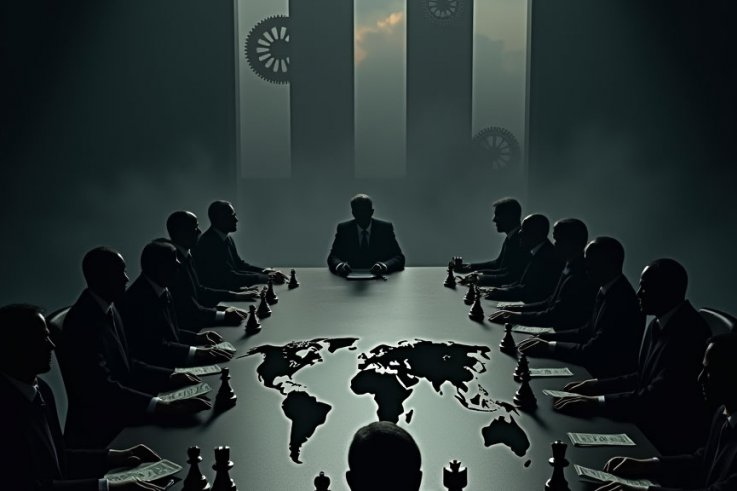James M. Wright’s Hurricane in a Teacup: The Relentless Myth of Man-made Climate Change challenges the widespread belief in man-made climate change, dissecting what he calls a politically driven agenda that claims to have scientific backing. Published in 2021, this book suggests that the climate movement’s ultimate goal is less about environmental preservation and more about advancing socialist economic transformations on a global scale. With...
The collapse of the Soviet Union in 1991 marked a historical turning point, not just for geopolitics but also for Russia’s internal economy. The 1990s became a period of unprecedented economic chaos, often referred to as the “economic plundering of Russia.” In his book Shadow Masters, Daniel Estulin unveils the hidden forces behind this tragic chapter in Russia’s history, revealing the key players who facilitated...
Throughout history, Germany has faced consistent efforts to weaken and suppress its rise as a unified and powerful nation. This pattern, rooted in geopolitical and economic rivalry, stretches back centuries, involving a web of oligarchic interests, financial manipulation, and strategic wars. The banking powers, often traced to the Venetian oligarchs and their successors, have played a significant role in shaping these efforts. By understanding this historical thread, we can better grasp the forces that have influenced European history and the […]...
The acquisition of Monsanto by Bayer AG has proven to be one of the most controversial and costly decisions in the history of German business. What seemed like a strategic move to dominate the global agricultural market quickly devolved into a financial quagmire, as Bayer became embroiled in thousands of lawsuits related to Monsanto’s Roundup weed killer. These lawsuits have drained billions from Bayer, crippling...
Germany, a nation often lauded for its economic strength and political influence within Europe, may not be as free and independent as it seems. Two provocative books—Peter Orzechowski’s “Besatzungszone: Wie und warum die USA noch immer Deutschland kontrollieren” and Bruno Bandulet’s “Beuteland: Die systematische Plünderung Deutschlands seit 1945”—unveil the shadowy forces and historical machinations that suggest Germany’s sovereignty is more fiction than fact. This is...
In his compelling bestseller, The Creature from Jekyll Island, Edward Griffin explores the intricate and often concealed mechanisms of global financial institutions, with a particular focus on the World Bank and the International Monetary Fund (IMF). One of the most striking themes in the book is the assertion that these institutions are not merely focused on economic development, but rather on promoting a hidden agenda—one of global socialism. Unveiling the World Bank’s True Purpose Griffin meticulously examines the World Bank’s […]...
In the annals of history, certain events have shaped the course of nations, and the true motivations behind them often lie beneath the surface. One such pivotal moment was America’s entry into World War I, a decision that had far-reaching consequences and was influenced by a complex interplay of interests. In this article, we delve into the revelations provided by Mr. Edward Griffin in his...
In a world that sometimes seems enamored with central planning and government control, Friedrich Hayek’s ideas on liberty and individualism continue to shine as a beacon of hope and reason. His seminal work, “The Road to Serfdom,” serves as a stark warning against the perils of planned societies and is a testament to the enduring importance of defending individual freedom. Hayek’s Rejection of Planned Societies:...
Speaking before Britain’s House of Lords in 1770, Sir William Pitt declared: “There is something behind the throne greater than the king himself,” thus giving birth to the phrase “power behind the throne.” In 1844, Benjamin Disraeli, England’s famed statesman, published a novel entitled Coningsby, or the New Generation. It was well known as a thinly disguised portrayal of his political contemporaries. In it, he wrote: “The world is governed by very different personages from what is imagined by those who are […]...
The Bank of Credit and Commerce International (BCCI) was a useful tool for many powerful clients, ranging from the CIA and the Medellín cartel to Osama bin Laden, al-Qaeda, and influential figures in both the Republican and Democratic parties of the USA. When BCCI was finally shut down, as much as $15 billion had been lost or stolen—the biggest publicly known bank fraud in the...
Synthetic Gasoline – Although we still do not know how nature produces oil, yet we possess already for a long time the knowledge to produce it artificially. Friedrich Bergius a German chemist received the Nobel Prize in 1931 in recognition for inventing the process for producing synthetic gasoline in 1913. Since 1927, I.G. Farben A.G. continued to improve this development process in their laboratories at the Leuna plant. Carl Krauch and...
Operation Patent theft (Unternehmen Patentenraub). Plenty of present-day authors have demonstrated that the German science and technology in the 1920’s, 1930’s and 1940’s extended far beyond the flash and bang of atomic weapons, flying discs, rail guns and any other unfathomable, fascinating technological innovations. It extended into the everyday life of the post-war world. The Allies took thousands and thousands of patents from German vaults at the close or just after the end of the war. This was carried out without payment or […]...













